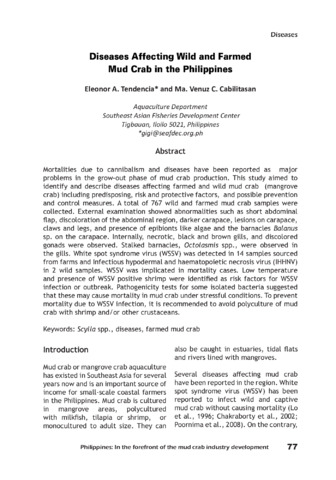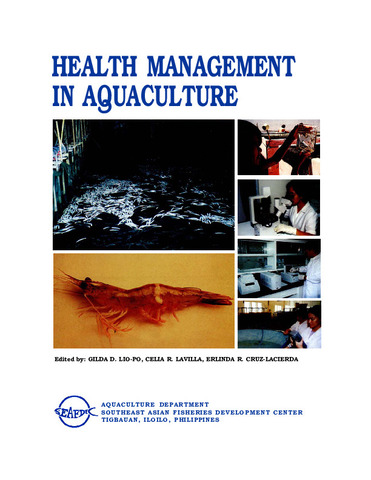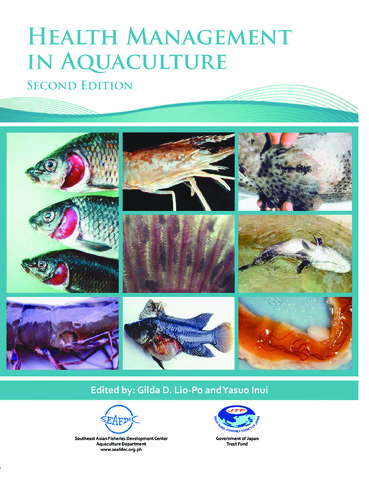Diseases affecting wild and farmed mud crab in the Philippines
- Global styles
- MLA
- Vancouver
- Elsevier - Harvard
- APA
- Help

Date
2017Page views
9,440ASFA keyword
AGROVOC keyword
Taxonomic term
Metadata
Show full item record
Share
Abstract
Mortalities due to cannibalism and diseases have been reported as major problems in the grow-out phase of mud crab production. This study aimed to identify and describe diseases affecting farmed and wild mud crab (mangrove crab) including predisposing, risk and protective factors, and possible prevention and control measures. A total of 767 wild and farmed mud crab samples were collected. External examination showed abnormalities such as short abdominal flap, discoloration of the abdominal region, darker carapace, lesions on carapace, claws and legs, and presence of epibionts like algae and the barnacles Balanus sp. on the carapace. Internally, necrotic, black and brown gills, and discolored gonads were observed. Stalked barnacles, Octolasmis spp., were observed in the gills. White spot syndrome virus (WSSV) was detected in 14 samples sourced from farms and Infectious hypodermal and haematopoietic necrosis virus (IHHNV) in 2 wild samples. WSSV was implicated in mortality cases. Low temperature and presence of WSSV positive shrimp were identified as risk factors for WSSV infection or outbreak. Pathogenicity tests for some isolated bacteria suggested that these may cause mortality in mud crab under stressful conditions. To prevent mortality due to WSSV infection, it is recommended to avoid polyculture of mud crab with shrimp and/or other crustaceans.
Suggested Citation
Tendencia, E. A., & Cabilitasan, M. V. C. (2017). Diseases affecting wild and farmed mud crab in the Philippines. In E. T. Quinitio, F. D. Parado-Estepa, & R. M. Coloso (Eds.), Philippines : In the forefront of the mud crab industry development : proceedings of the 1st National Mud Crab Congress, 16-18 November 2015, Iloilo City, Philippines (pp. 77-88). Tigbauan, Iloilo, Philippines: Aquaculture Department, Southeast Asian Fisheries Development Center.
Type
Conference paperISBN
9789719931072Collections
Related items
Showing items related by title, author, creator and subject.
-
Health management in aquaculture
Lio-Po, Gilda D.; Lavilla, Celia R.; Cruz-Lacierda, Erlinda R. (Aquaculture Department, Southeast Asian Fisheries Development Center, 2001)A textbook on diseases of cultured warmwater fish and shrimps in the Philippines. Eleven chapters cover essential information on the basic principles of disease causation, major diseases of cultured fish and crustaceans, ... -
Country status of aquatic emergency preparedness and response systems for effective management of aquatic animal disease outbreaks in Myanmar
Oo, Kyaw Naing; Cho, Yi Yi (Aquaculture Department, Southeast Asian Fisheries Development Center, 2019)Myanmar is one of the OIE members and the Department of Fisheries (DoF) is highly concerned with transboundary aquatic animal pathogens. Therefore, the Aquatic Animal Health & Disease Control Section has already been ... -
Health management in aquaculture
Lio-Po, Gilda D.; Inui, Yasuo (Aquaculture Department, Southeast Asian Fisheries Development Center, 2010-07)A textbook on diseases of cultured warmwater fish and shrimps in the Philippines. Eleven chapters cover essential information on the basic principles of disease causation, major diseases of cultured fish and crustaceans, ...







